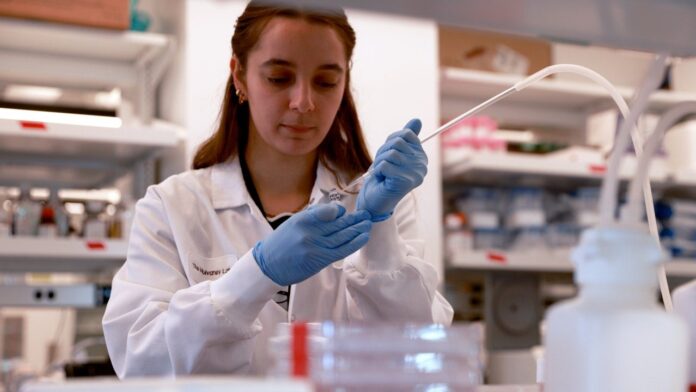Blanka Bordas did not plan to work in Washington, D.C., when she started her doctoral degree in the interdisciplinary Translational Biology, Medicine, and Health Graduate Program.
Like the rest of her 14-student cohort, she was based in Roanoke during her first year and explored the program’s focus areas. She rotated through three affiliated labs — two in Roanoke and one in the D.C. area. Finally, she decided to join the lab of Assistant Professor Kathleen Mulvaney at the Cancer Research Center at the Children’s National Research & Innovation Campus in Washington, D.C.
You choose your mentor
Mulvaney investigates how cells communicate inside tumors with a goal of developing therapies for hard-to-treat cancers in both children and adults. Bordas considered whether to focus on public health or cancer, and after spending time in Mulvaney’s lab, part of the Fralin Biomedical Research Institute, she realized that cancer was what interested her the most.
For Bordas, the most important thing in choosing a lab was the mentorship she would gain through her principal investigator. According to her, that person should be not only a dedicated scientist, but also someone who can effectively share knowledge, teach, and inspire students. Bordas said that she feels lucky that Mulvaney is not only an excellent mentor, but also conducts very interesting research in a beautiful new facility.
Bordas is originally from Texas and earned her bachelor’s degree at the University of Texas in Dallas. Now in her second year in the Mulvaney Lab, she studies an enzyme that modifies proteins and DNA and how that affects cancer. This research is very exciting because it has implications across a wide age spectrum regarding cancer.
Finding community
Bordas said one of the great things about working at the research institute is the ability to use the center’s labs, and the Johnson & Johnson Innovation and Children’s National collaborative labs equipment. The people in the building are friendly and invite the Virginia Tech teams to participate in and attend programs and events. “It’s a very welcoming community,” she said.
One of the downsides is that she is isolated from the Virginia Tech student community, since she took her classes on Zoom and notes that it is not the same as being in a room with her peers. She returns to Blacksburg at least once a year to connect with her translational biology, medicine, and health peers in person. She said she enjoys catching up with her friends there and learning about what her classmates are studying.
Looking to the future
She lives in Northwest Washington and explores the area as often as she can. “I love to walk and explore the different neighborhoods,” she said. She also enjoys taking advantage of the free museums and cultural events that the D.C. area offers.
As she looks to her future, she wants to continue conducting research. “I think I’d like to stay in academia,” she said. “I love doing research and I love being in a lab. It’s cool science.”
By Cathy Grimes

